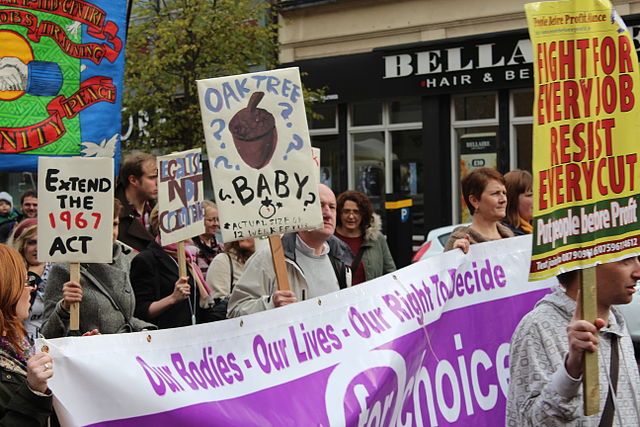LONDON, UNITED KINGDOM – What does a commitment to human rights look like? To the U.K. government, it means avoiding any explicit mention of bodily autonomy and reproductive rights.
On July 5, the United Kingdom published a joint multinational statement on freedom of religion and gender equality resulting from the 2022 International Ministerial Conference on Freedom of Religion or Belief, an international human rights conference. Twenty-two countries were originally co-signatories to this statement, but that quickly changed after a quiet deletion of a significant passage on sexual and reproductive rights by the Foreign, Commonwealth & Development Office (FCDO).
This passage described a commitment to abolish laws that “allow harmful practices, or restrict women’s and girls’ … sexual and reproductive health and rights, bodily autonomy.” As a result, only eight co-signatories, including the United Kingdom, are left on the website. Countries like Norway, Denmark and the Netherlands are refusing to sign the edited version of the statement unless their concerns about the deleted passage are appropriately addressed. The FCDO responded by saying the removal was to make clear a “perceived ambiguity” in the wording.
While the logic of removing details of a reproductive rights commitment to make a statement less ambiguous may seem backward, this is hardly new for the United Kingdom. Contradictory statements and legislation are a hallmark of the conservative-led country, most remarkably regarding reproductive and abortion rights.
Abortion is legal in the United Kingdom under the 1967 Abortion Act, but only under certain circumstances. If a person does not have their abortion approved by two doctors, performed by a doctor in a healthcare setting, and is not beyond 24 weeks of pregnancy, they will be subject to the punishments of the 1861 Offenses Against the Person Act (OAPA), an archaic law that carries up to a life sentence in prison.
So while abortion is technically legal in the United Kingdom, this legality exists merely as an exception to a Victorian-era criminalization of the procedure.
People today are still getting charged and tried under the OAPA, including a 25-year-old woman accused of “unlawfully administer[ing]to herself a poison or other noxious thing, namely Misoprostol,” a routinely prescribed abortion pill. Numerous other women are being accused of illegal abortions, accusations which are mainly based on nothing but stillbirths and pregnancy losses.
But why is there so much contradiction regarding laws on reproductive rights? According to parliamentarians, abortion is an issue of conscience, referring to issues like the death penalty, euthanasia and homosexuality, which means that MPs vote on issues “according to their moral, ethical or religious beliefs.”
It is absurd that majorly consequential issues are left to individual parliamentarians’ wildest personal beliefs, while every other inessential political issue is dealt with party democracy. Reproductive rights are not an issue of morals or politics; they are a matter of fundamental healthcare. Designating these rights as conscience issues is problematic, especially as the majority of British lawmakers will never be affected by this so-called conscience issue.
The crackdown on abortions does not stop there. The Human Rights Act (HRA), passed in 1998, is a historic and successful piece of legislation. It has enshrined fundamental economic, social, and political rights in U.K. law, rights which have allowed for the investigation of the police’s mishandling of violence against women cases like Sarah Everard’s, and the government’s mishandling of the pandemic in its adherence to the Covid restrictions.
The U.K. government is scrapping the HRA and instead introducing the Bill of Rights Bill. Forging rules and laws in their favor, such as passing racist and discriminatory immigration policies to deport incoming refugees to Rwanda without intervention by the European Court of Human Rights, is just another attempt at securing British control by power-hungry politicians.
In the new bill of rights, the government has refused to include abortion rights, claiming the issue was already “settled in U.K. law.” This is yet another unconvincing excuse, especially considering the terms of existing abortion legislation are intrinsically flawed, given the OAPA’s looming authority. It evidently doesn’t matter to them which marginalized groups’ rights are trampled in the process, whether it is asylum-seekers or people with uteruses, and it remains unclear to what extent the U.K. government will go in backtracking on fundamental human rights.
Beyond quiet removals of references to abortion, parliamentarians like Nadine Dorries are actively trying to attack abortion rights. Dorries has been advocating for lowering the limit for abortion from 24 weeks to 20 since 2008, despite legitimate medical reasons not to. This advocacy turns a medical issue into an arbitrary designation, and it is a slippery slope from here if her campaign gains traction.
As these events closely follow the overturning of Roe v. Wade, the United Kingdom is starting to seem like a 51st U.S. state, following in the country’s tracks of government crackdowns on reproductive rights and an increase of anti-choice protests, all worsened by an overworked and underfunded NHS. As a result, the health and lives of women, transgender people, nonbinary people, poor people, and people of color will be affected the most.
Policies surrounding abortion and reproductive rights in the United Kingdom are not as progressive as many previously have thought. With a new prime minister soon to be voted in by the Conservative party, the attack on reproductive rights is not going away anytime soon.
Both Tory candidates Rishi Sunak and Liz Truss have historically abstained on most, and in the case of Sunak, all, major abortion votes, proving their prior commitments to protecting women’s rights to be all smoke and no fire. Abstention is silence, and it speaks volumes.
Regardless of which candidate gets voted in as Britain’s next prime minister, the dangerous backpedaling of reproductive rights will only worsen without serious and actionable intervention to promote decriminalization of abortion and reproductive justice. The United Kingdom prides itself on its safe and accessible healthcare, so it is time to finally act on it.







